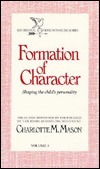Quite the random assortment of anecdote, philosophy, reflection and review. It felt like an antique shop of wisdom where one sorts through piles of dusty and fascinating relics to find absolute treasures tucked in between. I found the first section of 'case studies' rather entertaining, and felt a mixture of consent and disagreement.
For example, "In a general way, I do believe it's best to deal with a child's faults without making him aware that he has them. It fills the little beings with a ridiculous sense of importance to have anything belonging to them, even a fault."
I can see the wisdom in this, but ultimately, I believe that children need to see their faults, not as a personal quirk, but a manifestation of the brokenness that sin brings and a pointer to their need for Christ. This deficiency of clarity about the fallen nature shows up through out the book, and it is only subtle, because Mason does understand much of human nature, but in my opinion, the Victorian reverential reluctance to be open about matters of the soul and God weakens the force of her wisdom.
That said, the majority of this book was a positive learning experience and deeply challenged me, not only in how I educate my children, but in my own personal growth. Here are some favorite quotations:
"'Who would be pert enough to think of schooling a young mother? Not I, at any rate. Don't I know that every mother of a first child is infallible, and know more about children than all the old doctors in creation?'"
"I hardly see how to work it yet, but when one is steadfastly purposed, ways arise."
"The unoccupied mind offers harbourage, as we know, to the seven devils, and intellectual emptiness, inanition, is probably the provocative cause of much that we deplore. Perhaps few schoolboys give a though to their studies beyond the mere grind necessary to get them over; and yet boys are by nature consumed with intelligent curiosity. Give them entrancing studies which shall occupy their thoughts, and afford subjects for talk, as we all talk about the book we are reading, and there is no longer a vacuum for unclean imaginings to fill."
"Firmness on the mother's part in enforcing promptness in the taking off and putting on of outdoor clothes, etc., and punctuality at meals, and in not allowing one occupation to overlap another, secures many a half-hour of pleasant leisure for the young people, and has the double advantage of also making them feel themselves under a firm home rule."
"It is in the force of all-mighty gentleness that parents are supreme; not feebleness, not inertness - there is no strength in these; but purposeful, determined gentleness, which carries its point, only 'for it is right.' 'The servant of God must not strive,' was not written for bishops and pastors alone, but is the secret of strength for every 'bishop,' or overlooker, of a household."
"Every one is agreed that animated table-talk is a condition of health...But conversation at table is something more than means of amusement and refreshment. The career of many a young person has turned upon some chance remark made at the home table."
"The woman who has herself well in hand, who thinks her own thoughts, reserves her judgments, considers her speech, controls her actions - she is the woman who succeeds in life, with a success to be measured by her powers of heart, brain, and soul."
"Train her by trusting her. Believe her always; give her opportunities to condemn herself in speaking the truth, and her courage will answer the demand upon it."
"Let them not grow up with the notion that Christian literature consists of emotional appeals, but that intellect, mind, is on the other side. Supply them with books of calibre to give the intellect something to grapple with...the danger is, that young people in whom the spiritual life is not yet awakened should feel themselves superior to the vaunted simplicity of Christianity."
"Reason is, as we know, ready with arguments in support of any position the will has taken up."
"Children should know the things of nature as we know our friends, by their looks and ways, an unconscious comprehensive knowledge which sinks in by dint of much looking, but we set them to fragmentary scraps of scientific research. They intend investigation, and lose the joy of seeing."

